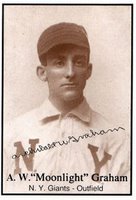 Brad Lidge, one of the league's best closers until his mojo was apparently stolen by Albert Pujols in Game 5 of the 2005 NLCS (2.60 ERA in three seasons previous, 5.52 since), has lost his job again, with the Astros giving the nod to Dan Wheeler, who got his first Save of 2007 yesterday. Brad Lidge, one of the league's best closers until his mojo was apparently stolen by Albert Pujols in Game 5 of the 2005 NLCS (2.60 ERA in three seasons previous, 5.52 since), has lost his job again, with the Astros giving the nod to Dan Wheeler, who got his first Save of 2007 yesterday.
Kudos to Doc Gram and others who drafted Wheeler for peanuts in anticipation of the final stages of Lidge's fall from grace. But more importantly, kudos to all those fantasy managers out there who didn't overpay for closers in a thin year. All three of you.
Most people took the lack of depth in this year's closers to be a signal to buy based on scarcity. In two leagues that Doc Gram snake-drafted, the front-line closers were all gone by the 10th round, and nearly any closer with any value gone by round 16.
This is just ridiculous. True, there are a handful of closers that always return value at the very top of the ranks, but in any given year, 20-33% of the closing roles change hands during the year - and this year it looks like it will be closer to 33%.
If you accept that idea, does it really make sense to spend high draft choices/big auction $ on 2nd tier closers (guys who get Saves but not much else)?
Think about it. Are the list of the #4-#10 closers EVER the same year to year? No, because it's just as much based on opportunity as ability.
The Save is the only stat in which the manager decides who receives it. Nothing but ability prevents batters from attaining any of their stats (maybe less so for SB). Nothing but talent precludes a a pitcher from a good WHIP and ERA - and even throwaway middle relievers can get Wins. But only the preordained get Saves.
And because the decision on who to crown Closer rests with the manager, there's going to be a lot more volatility. Managers more often try to put themselves in the best position to win that day and over the next week or two than they do to try to ascertain who will help them most over the course of a season or a few years. That's the GM's job.
Batters are also more likely to be seen as long-term investments compared with pitchers who many people think either have "it" or don't. An organization will give a struggling young batter a full year to prove himself. A manager will give a closer a full week.
The manager needs to win NOW, so he is necessarily impatient, and therefore more likely to make changes in those areas like closing role that are seen as his call.
What this means is that second-tier closers (those who don't earn outstanding WHIP, ERA, K/9) are only as good as their last start, and a single decision away from losing their sole statistical value. They are therefore at a significantly higher risk to fall short of their projected potentials. So why invest your picks or auction cash so deeply in them?
Don't say because of scarcity, because there will be around the same number of saves this year as there always are, even though it might be harder to find them in one neat package along with other desired skills. Scarcity is a good reason to pick a perennial lock on a good team like Mariano Rivera. It is not a good reason to pick Salomon Torres for $15.
Instead, do what Doc Gram did, and spend more of your picks/money on batters or starters, and then late in the draft or via waivers, take the best set-up men out there in terms of skills like ERA, WHIP and K/9 - there are several whose underlying skills are better than the closers they set up. They'll still provide minor value in those skill categories while they await their big shot. Plus, it's only a matter of time until some manager gets impatient somewhere and hands the car to someone else - and those with the best pitching skills will ultimately get the keys. Dan Wheeler is revving Doc Gram's engine as we speak.
Examples: Matt Capps, Jonathan Broxton, Justin Ducscherer, Mike Gonzales, Scott Linebrink
|







0 snarky comments:
Post a Comment